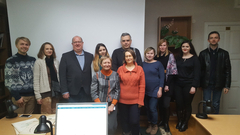Muscat Workshop with Guido Kraus in L'viv (12-14 February 2019)
Angelika Moths
Thursday, April 11, 2019

We have received the following from Angelika Moths:
Initiated by the Haliciana Schola Cantorum (HSC), a Swiss association for the promotion of culture in Western Ukraine, an international musicology symposium called “Ex umbra in solem” was held at the Ukrainian Catholic University in L’viv in November 2017. During the event, the urgent need became clear for Ukrainian musicology to have music materials documented in the RISM database that are preserved in Ukrainian libraries and archives. Prof. Dr. Christoph Wolff generously ensured that direct contact was established between the HSC and the RISM Central Office in Frankfurt am Main. Angelika Moths, co-organizer of the symposium and a member of the HSC, went to Frankfurt to talk to Klaus Keil about the possibilities. Keil suggested offering a workshop to introduce the cataloging program Muscat to anyone who is interested.
In the 1990s as well as in summer 2013, RISM workshops on cataloging musical sources were held in Kiev. RISM work ceased there not least because of the political situation at the time. Since RISM’s earlier cataloging programs are no longer in use, it made sense to start from the beginning again with a fresh perspective. This was especially made possible thanks to the energetic support of Ol’ha Osadcja (head of the Music Department at the Stefanyk Library) and Vasyl Kmet’ (director of the Iwan Franko University Library), who countered their colleagues’ apprehension concerning outside influences.
It was therefore a great achievement to be able to hold a Muscat workshop from 12 to 14 February 2019 at the National Vasyl Stefanyk Scientific Library of Ukraine (RISM library siglum: UA-LVs) and the Iwan Franko University Library (UA-LVu), which was led by Guido Kraus, a RISM staff member who has a lot of experience in Eastern Europe. Workshop participants included librarians from these institutions, the National Music Academy, the S. Krushelnytska Museum, and some students from the HSC network. In total there were fifteen participants. The workshop focused on cataloging handwritten and printed music sources, which might be found as individual items or in collections, each with very different cataloging requirements. In addition, technical applications of Muscat were presented that allow links, photos, and digitized material to be attached to records in the program, as well as faster cataloging procedures such as autocomplete and duplicating existing entries. Last but not least, the comments function in Muscat and the ability to manage one’s own data in the system were presented.
In order to make working with Muscat easier for our colleagues, our colleague Petro Zherukha, a member of the HSC and a participant in the RISM workshop, will translate the Muscat cataloging guidelines from English into Ukrainian.
Our colleagues can start working as soon as they receive their personal login information for Muscat. They can ask Guido Kraus for support at any time. In order to achieve results as quickly as possible and to emphasize the nature of this project as a pilot project, we have asked for a united effort to be directed to first cataloging the holdings of the Iwan Franko Library, since this is a collection that is manageable in size and is already well documented (mainly printed music and manuscripts from the 16th and 17th centuries). This work will be carried out and completed this year if possible. The director, Vasyl Kmet, is very interested in this work because he sees it having an international impact on his library and more opportunities for collaboration.
The primary goal of the HSC, which sees itself as a facilitator in this process, is first to catalog the library collections in L’viv. Since resuming work in Galicia has also seen positive signals come from Kiev, we will not rule out the possibility of offering a further Muscat workshop there. Guido Kraus has already expressed his interest.
After completion of the above-mentioned pilot project, the results will be summarized in a presentation that can then be used by other libraries as a basis for work and encouragement to catalog their music in RISM and thus make it internationally visible. We hope that this will lead to further international cooperation with other European libraries so we can search for financing together and thus expand RISM’s work in Ukraine.
Share Tweet EmailKategorie: Veranstaltungen

